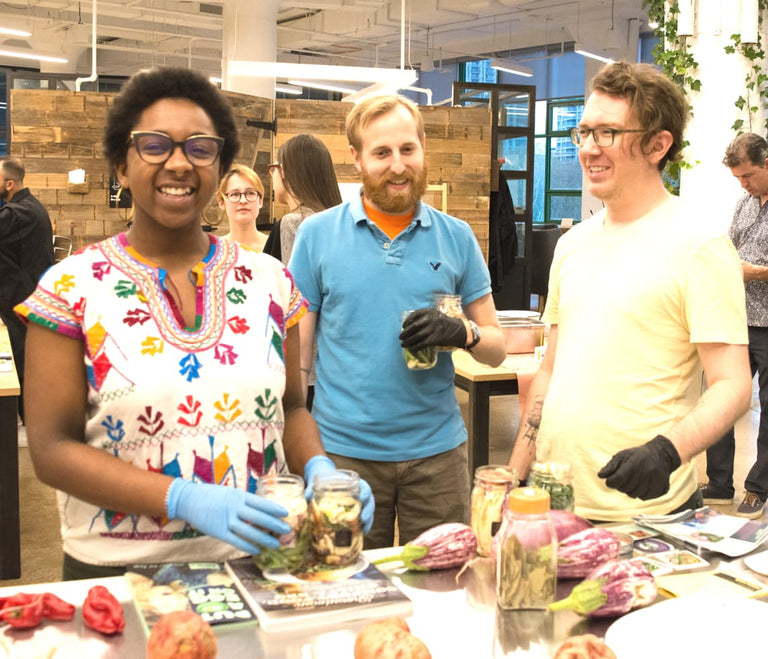Your Guide to Heritage Pork

Think about heritage pigs like a fine aged wine. Heritage breeds are raised for longer than conventional pigs, which allows them to develop maximal tenderness and flavor. Farmer Nolan Thevenet of Stryker Farm has raised heritage pigs since he started farming on his family's land in the Poconos. His pigs grow slow and have keen survival instincts that make them more adaptable to outdoor living. This unconventional approach to meat farming means his pigs exercise and forage 90% of their own food – both of which contribute to intramuscular fat and marbling.
Because heritage pork requires pastures for roaming free and foraging their own food, industrial farming practices have come to rely on breeds of pigs that can withstand smaller spaces and grow at faster speeds. Yorkshire pigs, also known as Large Whites, are the perfect fit for these conditions and requirements. Both of these factors are seen as more economical, though quality and flavor is often lost in the process.
Caterer and food stylist, Jenn de la Vega, told us that she finds heritage pork to be much tastier, too. “The pork is in much better condition than what you may see at the store. Compared to meats that have been frozen multiple times (which is unsafe), it isn’t slimy. Heritage pork smells fresher, and renders the most delicious fat, which you can save to fry foods or make tortillas. Knowing exactly which farm it comes from puts my mind at ease.”
Larger facilities may be designed to maximize profit, but they have long been criticized for their mistreatment of livestock – crowding them into dirty stalls and forcing them to live in inhumane conditions. In response to a growing awareness of these issues, more and more heritage pork farms have begun to pop up across the nation to meet the demand for sustainably and ethically-raised meat. According to Brad Weiss, author of Real Pigs, roughly 5% of the pork sold in the United States is now heritage raised, and this number is on the rise.
Industrially-raised pigs are fed soy and corn in order to fatten them quickly within a short period of time. They were developed through years of genetic selection and artificial insemination. In contrast, heritage breeds each come with their own unique agricultural history and culinary tradition. Each one boasts differences in flavor, texture, and marbling. They tend to live about 9 months to two years.
Nolan takes great care in the work he does, and it shows in the quality of Stryker Farms heritage meat. Want to see for yourself just how delicious Stryker Farms meat can be? Check the link to our subscription to our Meat Classics and Premium Meats subscriptions!

What is your role at Stryker Farm?
As the business owner, I find myself filling many different roles and my roles have evolved over time. I would say I work part-time as livestock manager, part-time office manager, part-time customer service and part-time delivery driver.
Walk us through what you did today on the farm.
Thursday is an order packing day since we have deliveries going out, so I spent the entire day in the walk-in cooler packing orders for customers.
Are there specific tools that you can't work without today? How do you use this tool?
A computer is vitally important to my business. In this day and age we could not communicate to our customers or sell our products without the internet.
How did you first get involved in raising pigs?
The land that I had to work with is heavily wooded, hilly, and not suitable for most other types of agriculture. Therefore, I chose to raise pigs since it was one of the only forms of agriculture that made sense on our land.
Can you talk us through the decision making process on what breed of pigs you raise? Why did you decide to focus on heritage breeds?
I wanted to raise pigs that would thrive outdoors with minimal interference. Heritage breeds are hardy and more resilient than modern hybrids, so it was a no-brainer. We started with a mix of heritage breeds and selected the best genetics over time.

What is a heritage breed pig? What qualifies “heritage breed”?
Heritage breeds are just pigs that have not been heavily manipulated by humans to grow faster and leaner. What we call "heritage breeds" was just a normal pig 100 years ago before agriculture became industrialized.
What are some of the different breeds you work with, and why have you chosen those in particular? How do they differ from each other?
We have a mix of Tamworth, Berkshire, Yorkshire, Large Black, Old Spot and Hereford. We just started with whatever pigs we could find locally and kept breeding the best genetics over the years. The breeds have some differences but we don't focus on breed as much as individual characteristics. Specifically we want pigs that are hardy, good mothers, with a calm temperament and good meat quality.
What are the benefits and challenges of farming heritage pigs versus any other pigs?
Heritage breeds grow slower and consumer more feed, so we have to charge more for the final product.
Could you talk about the taste difference between heritage and non-heritage pork?
Heritage breed pork will typically have a deeper red colored meat, more fat and more of a pork flavor.
Is cooking with heritage pigs different than cooking with non-heritage?
With a higher fat content, the heritage pork will usually not dry out as quickly as non-heritage pork. So when you cook the pork chops, they should come out moist and flavorful compared to non-heritage pork chops.
What are some of the biggest and most current struggles that you find yourself dealing with as a livestock manager?
It's difficult to get away from the farm for personal events or vacations when you have so many animals to think about!
What are your goals for 2020 on the farm or personal life?
Just enjoying life and being grateful I am able to wake up every day and do what I want for a living.
Article and Interview by Local Roots volunteer Jess Santoro.
Rather have a taste first?
Local Roots Experiences are fun, pop-up events where we bring the farm to you!

Become a Harvest Club Pick Up Location
Are you a NY based cafe, bar, or neighborhood business? Become a Harvest Club pick up location and have community members come to your establishment each week to pick up their Local Roots harvest.
Top






